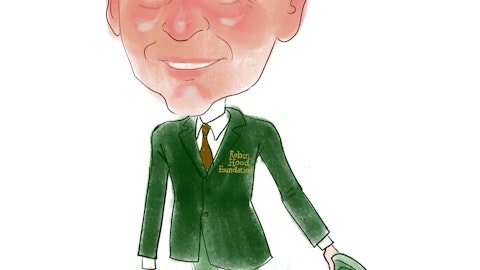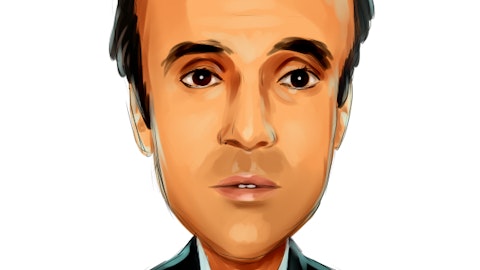Hedge Fund Elliott Proposes Celesio Breakup (WSJ)
Hedge fund Elliott Capital Advisors considers drug wholesaler McKesson Corporation (NYSE:MCK) -0.33% $6.1 billion takeover offer for Germany’s Celesio AG CLS1.XE +0.35% too low, and is instead proposing to break up Celesio in pursuit of a sweeter deal, three people familiar with the matter said. The hedge fund contends that splitting Celesio and selling its wholesale and retail operations separately would yield more than what McKesson is offering, people briefed on the matter said. …Elliott, which was founded by U.S. billionaire Paul E. Singer, began building its stake in Celesio earlier this year, and holds around 25% of the company when accounting for two convertible bonds.

Quantitative Trading Makes Inroads in Asia (WSJ)
High-tech trading is making inroads in Asia, as hedge-fund managers gain access to a wider range of market information and look to profit from strategies that go beyond picking which stocks may rise. Funds that utilize quantitative analysis, in particular, are finding favor in the region. Quant funds, as they are called, rely on mathematical models that crunch numbers from a variety of sources to arrive at trading decisions. “It’s a global trend but is playing out more here,” says Graham Seaton, head of Bank of America Corp (NYSE:BAC) -0.19% Merrill Lynch’s Asia Pacific prime brokerage, which provides services to hedge funds. “We know several providers that are looking at offering new equity quant products in the next six months.”
SAC Capital’s Reinsurer to Be Sold to Investor Group Headed by Duperreault (InsuranceJournal)
Steven A. Cohen, the billionaire founder of SAC Capital Advisors LP, agreed to sell a reinsurer he formed in 2012 after the hedge fund firm reached a $1.8 billion deal to end a criminal investigation. A group led by former Marsh & McLennan Companies, Inc. (NYSE:MMC) Chief Executive Officer Brian Duperreault entered an agreement to purchase the Bermuda-based operation, according to an e-mailed statement yesterday from the buyers that didn’t disclose terms. Duperreault is partnering with Two Sigma Investments LLC, the quantitative hedge fund-firm with about $16 billion in assets, according to the statement. “They’re a technology company that has really been at the forefront of data analysis,” Duperreault said in a phone interview…
Volcker Rule: New Legislation May Affect Hedge Fund Prime Brokers (HedgeCo)
As regulators prepare to vote on the proposed Volcker legislation that restricts banks from making risky bets, Albert Kyle at the University of Maryland says that the new rules may make hedge fund investments riskier unless their broker dealers ensure careful risk management. “Restrictions on banks engaging in proprietary trading will move risk out of banks and into hedge funds.” Albert Kyle of UM’s Robert H. Smith School of Business, said. “Since banks will remain the hedge funds’ prime brokers, risks associated with the disorderly collapse of hedge funds will spill back into the banking system unless prime brokerage has judicious, careful risk management.
This Hedge Fund Has Made a Killing on Bushmaster Assault Rifles (MotherJones)
Last December, four days after Adam Lanza murdered 20 first graders and six educators at an elementary school in Newtown, Conn., Cerberus Capital Management pledged to sell the Freedom Group, the company that manufactured the Bushmaster XM-15 assault rifle that Lanza used. The announcement helped tamp down a rising PR disaster for the Manhattan private equity firm, placating major investors such as the California State Teachers Retirement System (CalSTRS), which had said it was “examining” its $750 million stake in Cerberus after the massacre. The New York Times described the move as “a rare instance of a Wall Street firm bending to concerns about an investment’s societal impact.”
Citi survey finds ‘2/20’ fading (SecuritiesLendingTimes)
The business of hedge funds is caught between rising costs and falling management fees, holding little profit for managers that do not perform, according to a survey. The Citi Prime Finance 2013 Business Expense Benchmark Survey found that the traditional ‘2 and 20’ model of investment manager compensation—2 percent management fee and 20 percent of the profits—has declined to fee levels as low as 1.58 percent of assets under management for all but the largest managers. As a result, hedge fund managers, unlike their counterparts in traditional, long-only funds, barely break even simply collecting fees.
How will banks fare post-Volcker Rule? (CNBC)
New hedge funds need $300 million in assets just to break even (Reuters)
Traders launching a hedge fund need to raise at least $300 million in assets to pay for rising regulatory costs and to offset lower fees, a survey showed, a far cry from the pre-crisis days when managers could start with tens of millions. According to the survey by Citigroup Inc (NYSE:C), hedge funds now charge annual management fees of as low as 1.58 percent of assets, down from the traditional 2 percent that larger funds still command. Added to this, compliance and regulatory costs have risen because of new rules such as the Alternative Investment Fund Managers Directive in Europe and Dodd-Frank legislation in the United States.
Towry hires hedge fund expert (CityWire)
Wealth firm Towry has recruited a hedge fund specialist for its investment team. Mehdi Douali has joined Towry’s London office from BlueMountain Capital, where he worked with investors on the firm’s range of hedge funds. BlueMountain was one of the hedge funds to make a fortune on the other side of JPMorgan Chase & Co (NYSE:JPM)’s London Whale trade. Before BlueMountain, Douali worked as a senior investment analyst at Atlas Capital and as an exotic equities derivatives trader at Barclays Capital. Andrew Wilson (pictured), head of investment at Towry, described Douali as ‘an excellent investment specialist who I have been hoping to bring into my team for some time’.
A Time for Change: Activist Investor Plans to Increase Pressure on Bob Evans (TheLedger)
Last week, Bob Evans Farms announced that it had declined to make strategic changes recommended by one of its biggest investors. Now that investor, the hedge fund Sandell Asset Management, plans to turn up the heat on the restaurant operator. Sandell intended to announce Monday that it will move for change at Bob Evans, potentially including replacing its directors, according to people briefed on the matter who spoke on condition of anonymity because they were not authorized to speak publicly about the fund’s plans. The hedge fund will begin a so-called consent solicitation, which will let investors vote on changes at Bob Evans outside an annual meeting, the people said. The fund could also seek to amend the restaurateur’s bylaws.
Carl Icahn’s growing sphere of influence (BostonGlobe)
It’s hard to say no to Carl Icahn. Just the latest example: Hologic, Inc. (NASDAQ:HOLX) of Bedford welcomed two of the activist investor’s lieutenants onto the medical product company’s board of directors Monday. At the same time, Hologic also named Stephen MacMillan as its new chief executive and made a point of telling everyone that MacMillan arrived with Icahn’s blessing. This is the way it often goes at companies in which Icahn takes a substantial interest (he bought more than 12 percent of Hologic’s stock two months ago). Companies usually react first by drawing up a “poison pill” shareholder’s rights plan to block the possibility of a hostile takeover and then negotiate a deal to put Icahn people on their boards. After that, things can get really interesting.
Hedge fund managers seek to set themselves apart through branding (PIOnline)
Hedge fund branding is increasing as institutional investors’ presence within hedge funds’ client bases is forcefully nudging even the most tight-lipped firms to open up and explain what they do. The Jumpstart Our Business Startups Act of 2012 might have lifted the ban on advertising private funds, but sources said the most important impact so far is the reassurance it provides to hedge fund managers about establishing a brand identity for their firm and investment strategies. To date, only a few very institutionally focused hedge fund and hedge funds-of-funds companies have deliberately set out to develop a brand presence aimed at clients, prospects and to some extent, the general public.
MARC FABER: Stocks Could Surge Another 20% From Here (BusinessInsider)
Marc Faber, author of “The Gloom Boom And Doom Report,” maintains as bearish a tone as ever. He warns that increased risks means that equity investors may not benefit from high future returns. Still, he believes that U.S. stocks may go up another 10-20% in 2014. Though he warns it’s too late to invest. …Faber joins fellow bears like John Hussman, Bob Janjuah, Richard Russell, and Jeremy Grantham who all warn that stocks may book another double-digit’s worth of gains before collapsing.
Recommended Reading:
Eurekahedge’s Regional and Strategy Hedge Fund Indices End Mostly in Green in November
John H. Lewis, Osmium Partners Increase Stake in Spark Networks Inc (LOV)
Mohnish Pabrai, Dalal Street Up Their Stake in Horsehead Holding Corp (ZINC)





